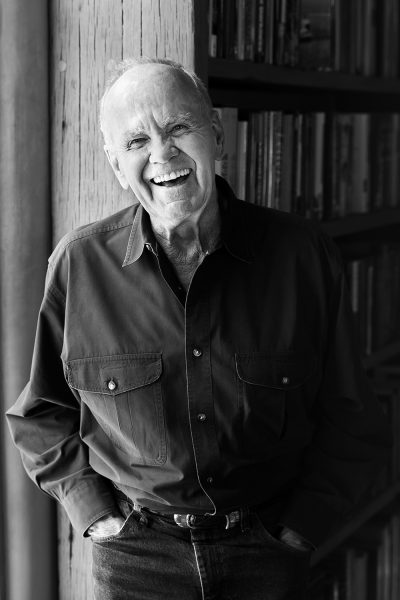
Brief Bio:
Cormac McCarthy (1933-2023) was a prolific American novelist known for his distinctive writing style, which often explored themes of violence, morality, and the human condition. He was born Charles McCarthy Jr. on July 20, 1933, in Providence, Rhode Island, later adopting the name Cormac, which he preferred for its Irish origin.
McCarthy spent much of his early life in Tennessee, where his family relocated during his childhood. He attended the University of Tennessee, but he left without graduating and began working various odd jobs, including as a mechanic and firefighter. His literary career began with the publication of his first novel, “The Orchard Keeper,” in 1965. The novel received critical acclaim and marked the beginning of McCarthy’s exploration of the American South and its landscapes.
Throughout his career, McCarthy was known for his reclusive nature, rarely granting interviews or making public appearances. Despite this, his novels have had a profound impact on contemporary literature, earning him a reputation as one of the most influential and celebrated writers of his generation.
Available Works in the Colorado Book Club Resource
The Book Club Resource has 8+ copies of each title available for 8 weeks at a time to reading groups across the state. The descriptions below were taken from Goodreads.com.
Blood Meridian (1985 ) | Discussion Questions
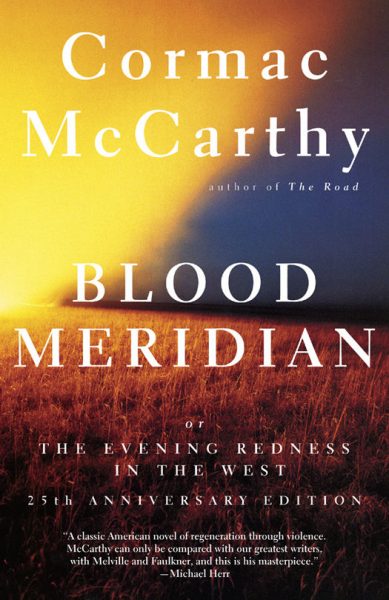 Blood Meridian is an epic novel of the violence and depravity that attended America’s westward expansion, brilliantly subverting the conventions of the Western novel and the mythology of the Wild West. Based on historical events that took place on the Texas-Mexico border in the 1850s, it traces the fortunes of the Kid, a fourteen-year-old Tennessean who stumbles into a nightmarish world where Indians are being murdered and the market for their scalps is thriving.
Blood Meridian is an epic novel of the violence and depravity that attended America’s westward expansion, brilliantly subverting the conventions of the Western novel and the mythology of the Wild West. Based on historical events that took place on the Texas-Mexico border in the 1850s, it traces the fortunes of the Kid, a fourteen-year-old Tennessean who stumbles into a nightmarish world where Indians are being murdered and the market for their scalps is thriving.
All the Pretty Horses (1992) | Discussion Questions
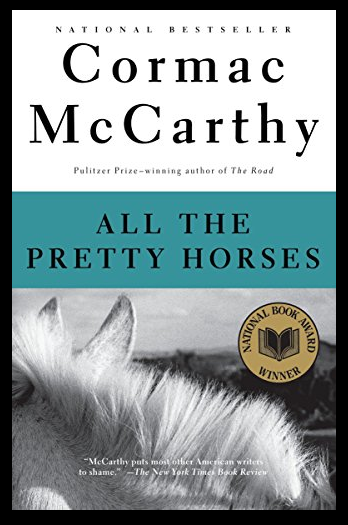 Teenager John Grady Cole, the last of a long line of Texas ranchers, has nothing left to stay for. Across the border Mexico beckons—beautiful and desolate, rugged and cruelly civilized. With neighbor Rawlins, and scruffy boy, he rides toward an idyllic, sometimes comic adventure, to a place where dreams are paid for in blood.
Teenager John Grady Cole, the last of a long line of Texas ranchers, has nothing left to stay for. Across the border Mexico beckons—beautiful and desolate, rugged and cruelly civilized. With neighbor Rawlins, and scruffy boy, he rides toward an idyllic, sometimes comic adventure, to a place where dreams are paid for in blood.
No Country for Old Men (2005) | Discussion Questions
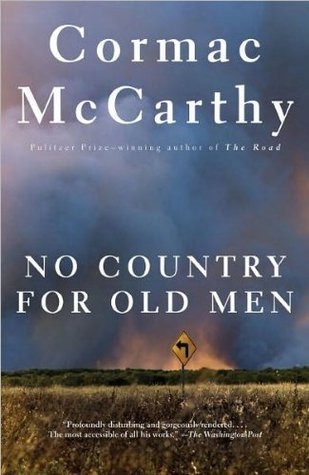 The setting is the Texas-Mexico border. The time is our own, when rustlers have given way to drug-runners and small towns have become free-fire zones. A good old boy named Llewellyn Moss finds a pickup truck surrounded by dead men. A load of heroin and two million dollars in cash are still in the back. When Moss takes the money, he sets off a chain reaction that not even the law can contain. Encompassing themes as ancient as the Bible and as bloodily contemporary as this morning’s headlines, No Country for Old Men is a triumph.
The setting is the Texas-Mexico border. The time is our own, when rustlers have given way to drug-runners and small towns have become free-fire zones. A good old boy named Llewellyn Moss finds a pickup truck surrounded by dead men. A load of heroin and two million dollars in cash are still in the back. When Moss takes the money, he sets off a chain reaction that not even the law can contain. Encompassing themes as ancient as the Bible and as bloodily contemporary as this morning’s headlines, No Country for Old Men is a triumph.
The Road (2006) | Discussion Questions
 A father and his son walk alone through burned America. Nothing moves in the ravaged landscape save the ash on the wind. It is cold enough to crack stones, and when the snow falls it is gray. The sky is dark. Their destination is the coast, although they don’t know what, if anything, awaits them there. They have nothing; just a pistol to defend themselves against the lawless bands that stalk the road, the clothes they are wearing, a cart of scavenged food—and each other. The Road is the profoundly moving story of a journey. It boldly imagines a future in which no hope remains, but in which the father and his son, “each the other’s world entire,” are sustained by love. Awesome in the totality of its vision, it is an unflinching meditation on the worst and the best that we are capable of: ultimate destructiveness, desperate tenacity, and the tenderness that keeps two people alive in the face of total devastation.
A father and his son walk alone through burned America. Nothing moves in the ravaged landscape save the ash on the wind. It is cold enough to crack stones, and when the snow falls it is gray. The sky is dark. Their destination is the coast, although they don’t know what, if anything, awaits them there. They have nothing; just a pistol to defend themselves against the lawless bands that stalk the road, the clothes they are wearing, a cart of scavenged food—and each other. The Road is the profoundly moving story of a journey. It boldly imagines a future in which no hope remains, but in which the father and his son, “each the other’s world entire,” are sustained by love. Awesome in the totality of its vision, it is an unflinching meditation on the worst and the best that we are capable of: ultimate destructiveness, desperate tenacity, and the tenderness that keeps two people alive in the face of total devastation.
The Passenger (2022) | Discussion Questions
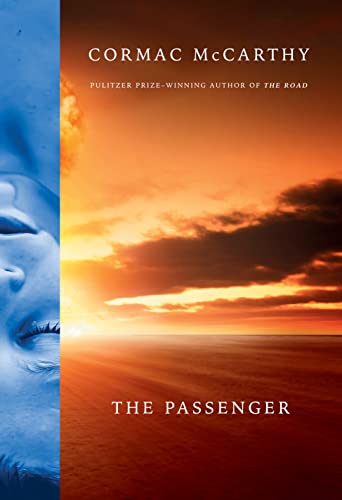 1980, PASS CHRISTIAN, MISSISSIPPI: It is three in the morning when Bobby Western zips the jacket of his wetsuit and plunges from the Coast Guard tender into darkness. His divelight illuminates the sunken jet, nine bodies still buckled in their seats, hair floating, eyes devoid of speculation. Missing from the crash site are the pilot’s flightbag, the plane’s black box, and the tenth passenger. But how? A collateral witness to machinations that can only bring him harm, Western is shadowed in body and spirit—by men with badges; by the ghost of his father, inventor of the bomb that melted glass and flesh in Hiroshima; and by his sister, the love and ruin of his soul. Traversing the American South, from the garrulous barrooms of New Orleans to an abandoned oil rig off the Florida coast, The Passenger is a breathtaking novel of morality and science, the legacy of sin, and the madness that is human consciousness.
1980, PASS CHRISTIAN, MISSISSIPPI: It is three in the morning when Bobby Western zips the jacket of his wetsuit and plunges from the Coast Guard tender into darkness. His divelight illuminates the sunken jet, nine bodies still buckled in their seats, hair floating, eyes devoid of speculation. Missing from the crash site are the pilot’s flightbag, the plane’s black box, and the tenth passenger. But how? A collateral witness to machinations that can only bring him harm, Western is shadowed in body and spirit—by men with badges; by the ghost of his father, inventor of the bomb that melted glass and flesh in Hiroshima; and by his sister, the love and ruin of his soul. Traversing the American South, from the garrulous barrooms of New Orleans to an abandoned oil rig off the Florida coast, The Passenger is a breathtaking novel of morality and science, the legacy of sin, and the madness that is human consciousness.
Stella Maris (2022) | Discussion Questions
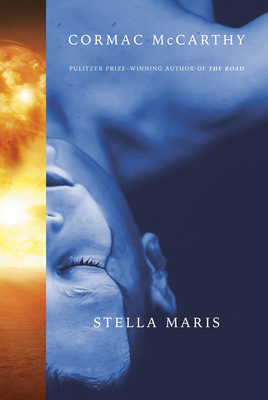 1972, BLACK RIVER FALLS, Alicia Western, twenty years old, with forty thousand dollars in a plastic bag, admits herself to the hospital. A doctoral candidate in mathematics at the University of Chicago, Alicia has been diagnosed with paranoid schizophrenia, and she does not want to talk about her brother, Bobby. Instead, she contemplates the nature of madness, the human insistence on one common experience of the world; she recalls a childhood where, by the age of seven, her own grandmother feared for her; she surveys the intersection of physics and philosophy; and she introduces her cohorts, her chimeras, the hallucinations that only she can see. All the while, she grieves for Bobby, not quite dead, not quite hers. Told entirely through the transcripts of Alicia’s psychiatric sessions, Stella Maris is a searching, rigorous, intellectually challenging coda to The Passenger, a philosophical inquiry that questions our notions of God, truth, and existence.
1972, BLACK RIVER FALLS, Alicia Western, twenty years old, with forty thousand dollars in a plastic bag, admits herself to the hospital. A doctoral candidate in mathematics at the University of Chicago, Alicia has been diagnosed with paranoid schizophrenia, and she does not want to talk about her brother, Bobby. Instead, she contemplates the nature of madness, the human insistence on one common experience of the world; she recalls a childhood where, by the age of seven, her own grandmother feared for her; she surveys the intersection of physics and philosophy; and she introduces her cohorts, her chimeras, the hallucinations that only she can see. All the while, she grieves for Bobby, not quite dead, not quite hers. Told entirely through the transcripts of Alicia’s psychiatric sessions, Stella Maris is a searching, rigorous, intellectually challenging coda to The Passenger, a philosophical inquiry that questions our notions of God, truth, and existence.
A Few Notable Facts
- McCarthy died at his home in Santa Fe on June 13, 2023, at the age of 89.
- Stephen King said McCarthy was “maybe the greatest American novelist of my time … He was full of years and created a fine body of work, but I still mourn his passing.”[citation]
- Socially, McCarthy had an aversion to other writers, preferring the company of scientists. [citation]
- McCarthy did not publicly reveal his political opinions. [citation]
- After 1958, McCarthy wrote all of his literary work and correspondence with a mechanical typewriter.
- While his research and revision were meticulous, he did not outline his plots and instead viewed writing as a “subconscious process” which should be given space for spontaneous inspiration. [citation]
Awards
- 1959, 1960 Ingram-Merrill awards
- 1965 Traveling Fellowship from the American Academy of Arts and Letters
- 1966 William Faulkner Foundation Award for notable first novel for The Orchard Keeper
- 1969 Guggenheim Fellowship for creative writing
- 1981 MacArthur Fellowship
- 1992 National Book Award for Fiction and the National Book Critics Circle Award for All the Pretty Horses
- 1996 International Dublin Literary Award longlist for The Crossing
- 2000 International Dublin Literary Award longlist for Cities of the Plain
- 2006 James Tait Black Memorial Prize for Fiction and Believer Book Award for The Road
- 2007 Pulitzer Prize for Fiction for The Road
- 2007 International Dublin Literary Award shortlist for No Country for Old Men
- 2008 Maltese Falcon Award, Japan, for No Country for Old Men
- 2008 Premio Ignotus for The Road
- 2008 International Dublin Literary Award longlist for The Road
- 2009 PEN/Saul Bellow Award for Achievement in American Fiction, for a career whose writing “possesses qualities of excellence, ambition, and scale of achievement over a sustained career which place him or her in the highest rank of American literature.”
- 2012 Best of the James Tait Black, shortlist, The Road
See also
- A life in quotes: Cormac McCarthy – The Guardian
- Cormac McCarthy Interview on Faulkner, Writing, & Science – YouTube
- Cormac McCarthy – Subconscious is older than Language – YouTube
- Couldn’t Care Less. Cormac McCarthy in conversation with David Krakauer – YouTube
- Dialogue with Cormac McCarthy About Science, on the occasion of his newest book releases – YouTube
Sources
Book club sets are circulated to participating libraries via the CLiC courier. Read all about the program on the Book Club Resource landing page. If you are interested in receiving book club sets but are not already a member library, use the online form to get signed up.
Since the BCR has always relied on book donations, we are deeply grateful to all of the institutions and individuals that have donated sets and helped make the collection stronger. Please contact bookclub@coloradovirtuallibrary.org for questions or to discuss donations.
- Book Club Author Suggestion: Kristin Hannah - May 21, 2025
- Accessibility Quick Tip: Invitation from OIT - March 19, 2025
- Book Club Author Suggestion: John Green - February 12, 2025